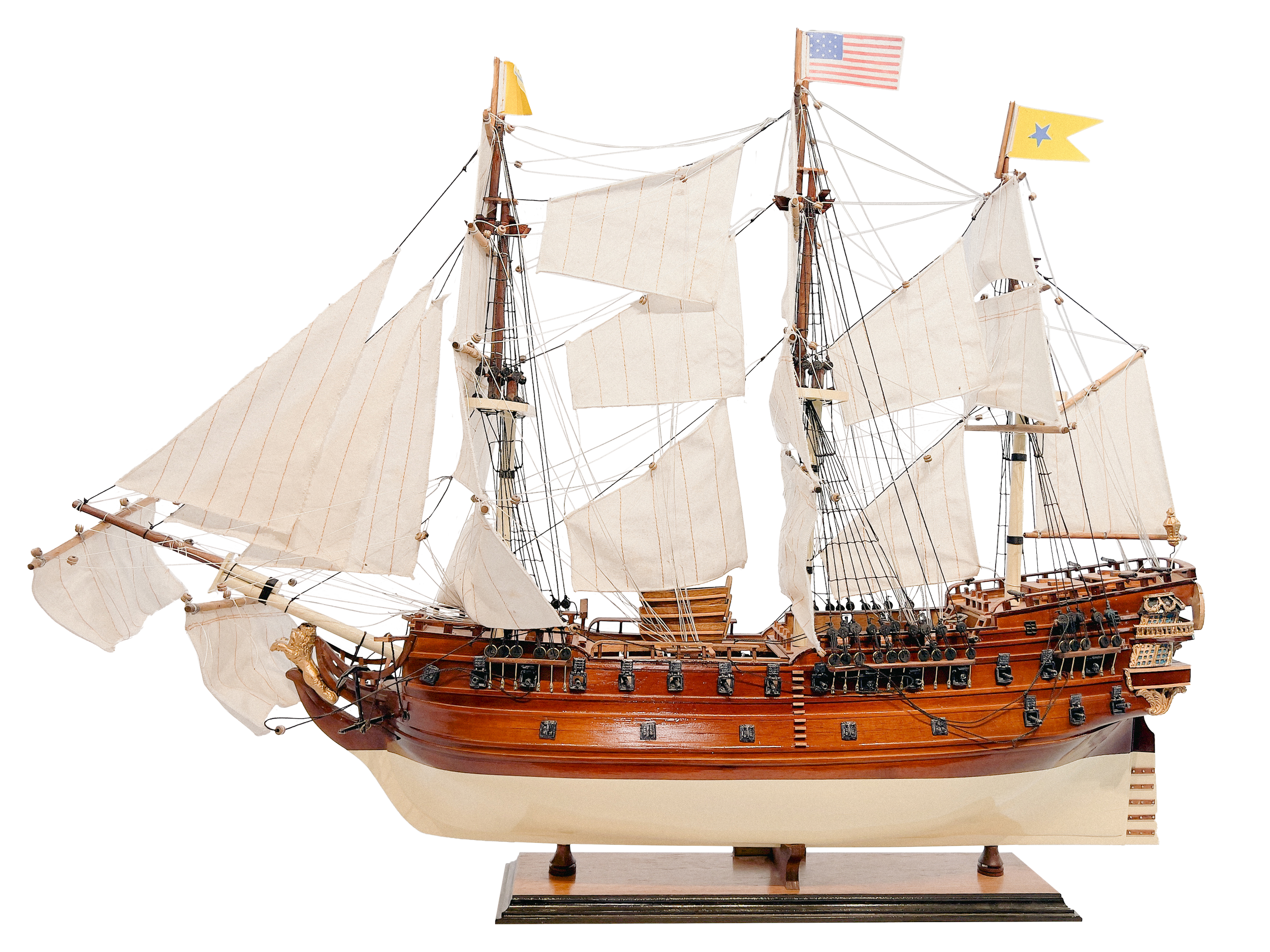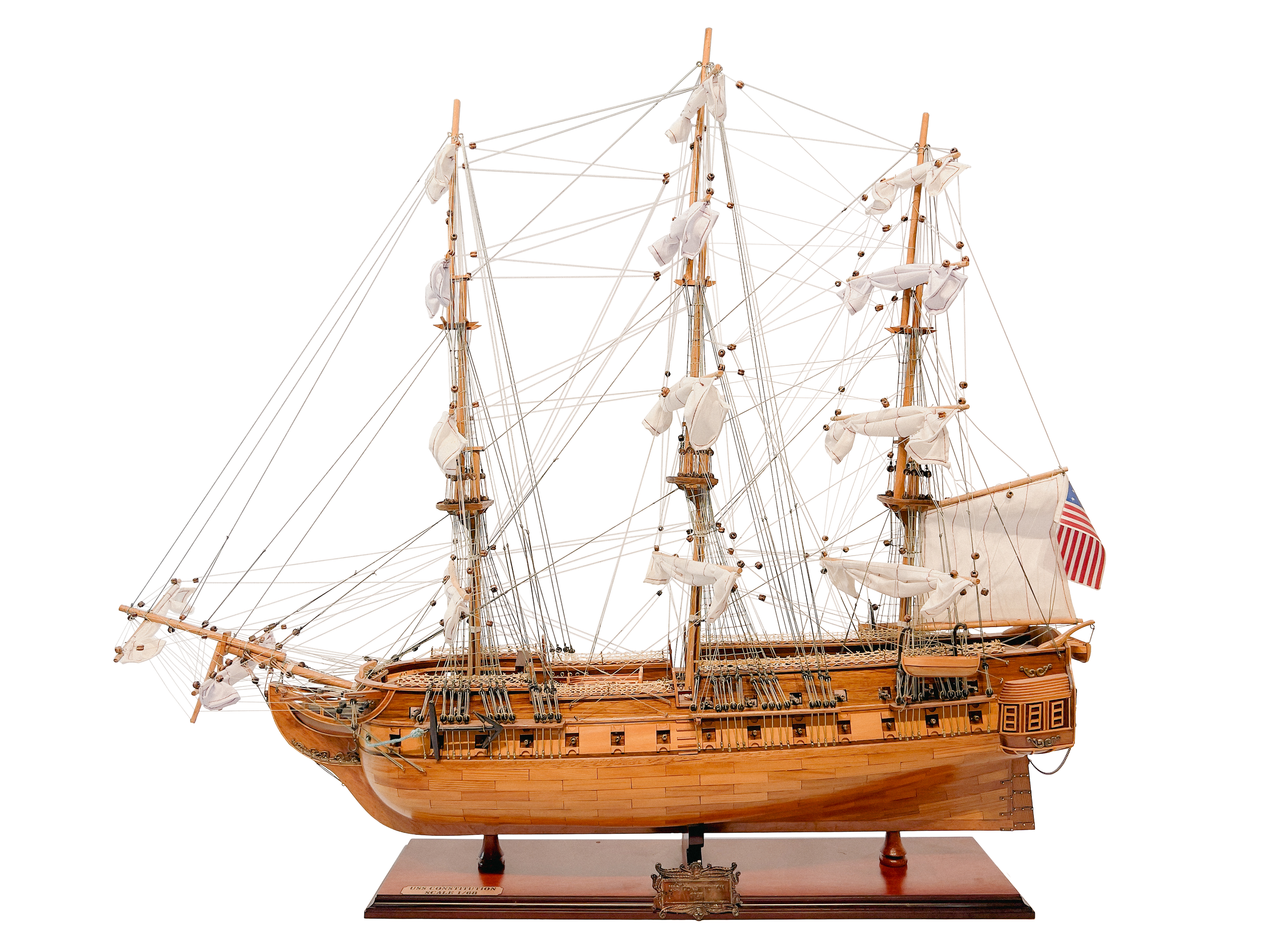zoom in on model
November 8, 1778 – March 1782
USS Confederacy
Scale 1/48
Credit: Museum of Military Models, Clyde, Texas. Private Collection of Warren D. Harkins.ON VIEW
General Characteristics
Type: Frigate
Tons burthen: 959, or 970+86⁄94 (bm)
Length:
US 153 ft (46.6 m)
British
Overall: 159 ft 7 in (48.6 m)
Keel: 133 ft 6 in (40.7 m)
Beam:
US 35 ft 6 in (10.8 m)
British 36 ft 9 in (11.2 m)
Depth of hold:
US 12 ft 3 in (3.7 m)
British 12 ft 1 in (3.7 m)
Complement: 260 officers and men
Armament:
Gun deck: 28 × 12-pounder (5 kg) guns
QD: 8 × 6-pounder (2.7 kg) guns
Fc: 2 × 6-pounder (2.7 kg) guns
Description
USS Confederacy was a 36-gun sailing frigate of the Continental Navy in the American Revolutionary War. The British Royal Navy captured her in March 1781. The British named her Confederate but never commissioned her. She reached England in about half a year and was broken up in 1782.
A Revolutionary War painting depicting the Continental Navy frigate Confederacy is displayed at the Navy Art Gallery at the Washington Navy Yard. USS Confederacy by William Nowland Van Powell.Ownership & Province
-
Name: USS Confederacy
Builder: Norwich, Connecticut
Launched: November 8, 1778
Fate: Captured April 14, 1781
-
-
Commanders:
US
Captain Seth Harding
Captain Nicholson
British
Captain James Cumming
History & Related Content
CAREER
She was launched on 8 November 1778 at Chatham (Norwich), Connecticut, and towed to New London to be prepared for sea. From 1 May to 24 August 1779 she cruised on the Atlantic coast under the command of Captain Seth Harding. While convoying a fleet of merchantmen, on 6 June, she and Deane captured three prizes, drove off two British frigates, and brought the convoy safely into Philadelphia, Pennsylvania.
On 17 September 1779 Confederacy was ordered to carry the French Minister and his family back to France. Later John Jay, the first American Minister to Spain, his secretary, and his family were added to the passenger list. During the passage on 7 November 1779 Confederacy was completely dismasted and almost lost, but managed through the skillful seamanship of Captain Harding to reach Martinique early in December. After repairs, she returned to convoy duty.
Captain Nicholson replaced Harding on 20 October 1780.
Confederacy was homeward bound from Cape Francois in the West Indies in 1781 with military stores and other supplies and escorting a fleet of 37 merchantmen, when on 14 April she encountered HMS Roebuck (44) and HMS Orpheus (32) off the Delaware Capes. The British ships forced the Confederacy to strike her flag. Most of the merchantmen she was escorting escaped. Many of her crew were sent to the old prison Hulk Jersey, though some ended up in Mill and Forton prisons.
British Drawing of the USS Confederacy (1781) – National Maritime Museum (London)FATE
The Royal Navy sent her to England, under the command of Captain James Cumming. He paid her off in September 1781. She was never commissioned and was docked on 18 November 1781 at Woolwich. She was broken up there in March 1782.
Interior of the prison ship Jersey, where many of the Confederacy’s crew ended their service. – Library of Congress, Prints and Photographs Division.






























